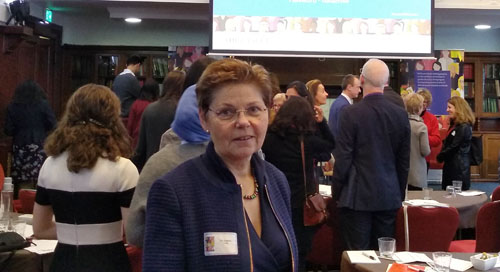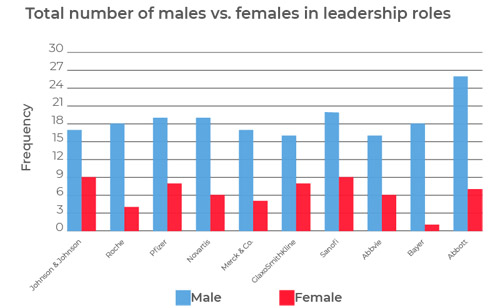Towards equality of the sexes in science medicine and global health
Posted on: Wednesday 7 August 2019
“In December 2018 CNN reported the average female doctor earns $105,000 less than her male colleague, a gap that’s been widening over time. The C-suite is plagued with a similar problem: A 2017 analysis estimated male executives earn millions of dollars more than women. And most recently, a new study reveals that male lawyers can earn 53% more than their female partners.”
CNN,Dec 19 20181
Such surveys are legion and recently the World Bank (Women Business and the Law – a Decade of Reform, 20192) reported that only six countries globally still do not discriminate between men and women legally.
In February this year on behalf of the Faculty of Pharmaceutical Medicine I attended a conference organised by the Lancet called “Advancing Women in Science, Medicine, and Global Health” to launch a special issue addressing this challenging topic3. It is difficult to attend such meetings without recalling the many anecdotes of events that relate to discrimination in the workplace over the more than 40 years since I qualified in medicine. It was, however, extremely gratifying to see that the Lancet, by their own admission in Richard Horton’s introduction, recognise that they have moved from being a bastion of male domination to running a conference such as this, addressing why the glass ceiling still exists. I am, in this brief review, going to refer to some of the common themes that ran through all the presentations of the papers. I would strongly recommend the issue is worth a read as it provides review of evidence and solutions which demonstrate the progress we have made in the last 40 years and how we can maintain the momentum.

Cultural issues of perception of women figured high in all the papers. These included assumptions made about women in terms of their needs relating to family life and their relationships, their ability to lead and manage and other bias that is inherent in all of us, regardless of our gender. These perceptions go well beyond the careers of the women in the professions being discussed, as they also apply to those who are our clients such as patients, students and, not least, the future generation that we are training in medicine, science and healthcare. One paper illustrated the fact that we are steadily moving towards reporting the difference in diagnosis or response to treatment by sex – but only very recently. There is limited recognition that disease in women and the treatment thereof may be different to that in men. When I raised this with a very senior medical woman recently, saying to her that we should give more consideration to diseases that predominate in women, the response was “we have obstetrics and gynaecology to do that!” I am sure that had she thought more closely about her response she would have been horrified at the implicit bias in this statement. The cultural challenges were discussed in a panel discussion where one of the statements made that generated the most nods was “When women are in a mixed committee meeting they are frequently not recognised for what they are saying until one of their male colleagues repeats the idea. Then the idea is attributed to the male colleague!”
The lack of representation of women is underlined by the paper on global health professionals and gender gap, which illustrated some of the reasons why women do not progress in their careers to leadership positions. Whilst the majority of women reported some kind of family or household obligation as a reason for struggling to progress, over 40% of women interviewed also reported at least one challenge relating to being made to feel inferior and being denied or discouraged from career progression. Finally, in spite of our #metoo campaigns, just under 40% reported that sexual issues with male colleagues was a barrier to career progression.
The career progression for female pharmaceutical physicians may also be hampered judging by the statistics. A study performed by Assured Pharma Ltd and reported in R&D Magazine in November 2018 states that of the 116 people on the boards of directors across the top 10 pharmaceutical companies4, 34 are female (29%). GlaxoSmithKline and Sanofi have the most diverse boards with 45% and 43% being female, while Bayer does not have a single female on its board of directors. Emma Walmsley of GSK is the only female CEO in top 10 pharma. With regard to gender equality in leadership positions in top 10 pharma, the figure below illustrates we have far to go. But we have made progress, compared to 30 years ago when I was on the Board of Parke Davis UK and Eire, and was one of only 2 women on the affiliate and main Board positions in the whole company.

An excellent paper from Stanford in California in the Lancet issue reflects that in anonymised funding applications women and men have much more equal chances than those where gender is declared. The UK treasury report to come out shortly entitled the Rose Review shows that in the world where increasingly research is translated to products by small companies, UK start ups run by women obtain 0.5% of the total money awarded by VCs.
An excellent paper from Stanford in California in the Lancet issue reflects that in anonymised funding applications women and men have much more equal chances than those where gender is declared. The UK treasury report to come out shortly entitled the Rose Review shows that in the world where increasingly research is translated to products by small companies, UK start ups run by women obtain 0.5% of the total money awarded by VCs.5
In Canada there are many initiatives towards resolving gender inequality. They include mentoring, appraisal, education and driving recognition of inherent gender bias. The Lancet issue is packed full of useful human resource tools for many of us to use in our leadership roles.
All in all, a valuable day but I fear until an economist writes a position paper similar to that published by Lord O’Neill on the impact of antibiotic resistance, it will still take time before the full understanding of women’s value to society is recognised not only as essential supporting roles in economic terms but as the leaders they should be.
1https://money.cnn.com/2018/03/14/news/economy/gender-pay-gap-doctors/index.html
2https://wbl.worldbank.org/
3https://www.thelancet.com/issue/S0140673619X00069 – Lancet Feb 09, 2019 Volume 393 Number 10171
4https://www.rdmag.com/article/2018/11/leadership-roles-are-scarce-women-big-pharma
5https://www.telegraph.co.uk/women/business/female-entrepreneurs-typically-start-businesses-half-much-capital/
